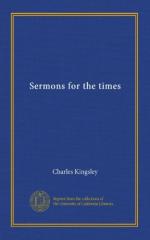But with a closer knowledge of our fellow-creatures has come toleration, pity, sympathy. And as that sympathy has been freely obeyed, it has justified itself more and more. The more we have tried to help our fellow-men, the more easy we have found it to help them. The more we have trusted them, the more trustworthy we have found them. The more we have treated them as human beings, the more humanity we have found in them. And thus man, in proportion as he becomes manifest to man, is seen, in spite of all defects and sins, to be hallowed with a light from God who made him.
And if it has been thus, in the case of God and of humanity, has it not been equally so in the case of the physical world? Where are now all those unnatural superstitions—the monkish contempt for marriage and social life, the ghosts and devils; the astrology, the magic, and other dreams of which I will not speak here, which made this world, in the eyes of our forefathers, a doleful and dreadful puzzle; and which made man the sport of arbitrary powers, of cruel beings, who could torment and destroy us, but over whom we could have no righteous power in return? Where are all those dark dreams gone which maddened our forefathers into witch-hunting panics, and which on the Continent created a priestly science of witch-finding and witch-destroying, the literature whereof (and it is a large one) presents perhaps the most hideous instance known of human cruelty, cowardice, and cunning? Where, I ask, are those dreams now? So utterly vanished, that very few people in this church know what a great part they played in the thoughts of our forefathers; how ghosts, devils, witches, magic, and astrology, filled the minds, not only of the ignorant, but of the most learned, for centuries.
And now, behold, nature being made manifest, is light. Science has taught men to admire where they used to dread; to rule where they used to obey; to employ for harmless uses what they were once afraid to touch; and, where they once saw only fiends, to see the orderly and beneficent laws of the all-good and almighty God. Everywhere, as the work of nature is unfolded to our eyes, we see beauty, order, mutual use, the offspring of perfect Love as well as perfect Wisdom. Everywhere we are finding means to employ the secret forces of nature for our own benefit, or to ward off physical evils which seemed to our forefathers as inevitable, supernatural; and even the pestilence, instead of being, as was once fancied, the capricious and miraculous infliction of some demon—the pestilence itself is found to be an orderly result of the same laws by which the sun shines and the herb grows; a product of nature; and therefore subject to man, to be prevented and extirpated by him, if he will.




